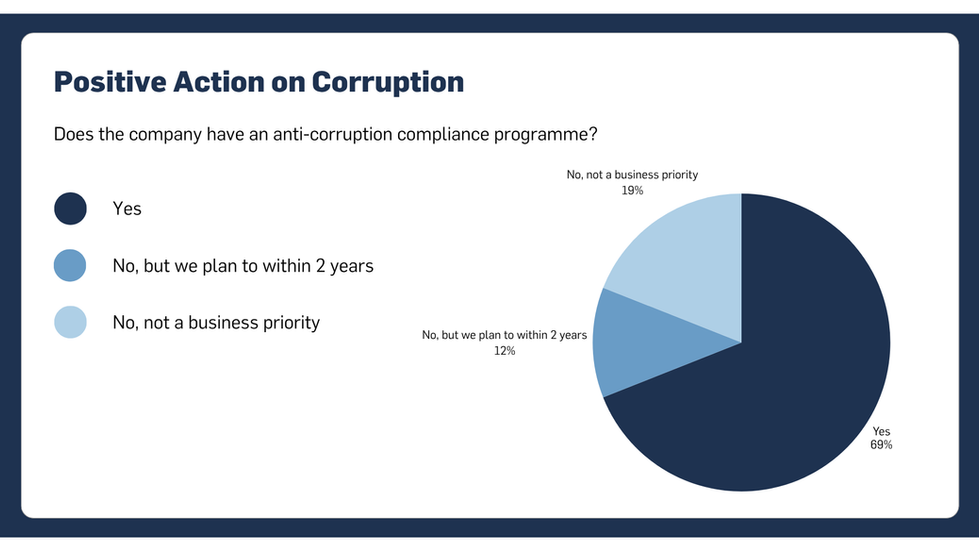Facts & Figures from the 2024 CoP: Where our participants stand in their sustainability journey
- Jun 17, 2025
- 4 min read
Updated: Jul 1, 2025
Each year, participants of the UN Global Compact report on their sustainability efforts through the Communication on Progress (CoP). More than just a formal requirement, the CoP is a valuable opportunity for businesses to reflect on their impact, demonstrate accountability, and share their progress in aligning with the Ten Principles of the UN Global Compact. It also serves as a strategic tool, helping companies strengthen their reputation, gain insights from peers, and benchmark their own progress in a global context.
This year, we are highlighting key data points that we find particularly relevant or insightful. All the figures shown below are based on aggregated data from the CoPs submitted by participants of the UN Global Compact Network Switzerland & Liechtenstein.
Governance
Good governance is the foundation of a sustainable business. It is how companies make decisions, ensure accountability, and manage risks. This is especially relevant in our globalized world, with its complex supply chains, political uncertainty, and ethical dilemmas. When companies operate in environments with weak legal systems or heightened corruption risks, strong internal governance becomes even more critical.
The data presented below offers a snapshot of how Swiss and Liechtenstein companies are embedding sustainability into their core structures. Our selection focuses on commitments, responsibility, due diligence, and executive incentives.
Human Rights
At its core, the concept of human rights is about inherent dignity and equal inalienable rights for all. Companies can impact human rights in many ways—including through their treatment of employees, management of supply chains, engagement with local communities, and interactions with users of their products or services.
Consequently, business enterprises share the key responsibility to respect human rights. The data below shows how companies in Switzerland and Liechtenstein are turning that responsibility into action. It focuses on whether companies have formal human rights policies and what practical measures they are taking to respect human rights across their operations.
Labour Rights
Labour rights are a cornerstone of decent work. They include the right to freedom of association and to the effective recognition of collective bargaining, to be free from all forms of forced or compulsory labour, the right to the effective abolition of child labour, to equality and non-discrimination in employment and occupation and the right to a safe and healthy working environment. These rights are recognized internationally as fundamental principles and rights at work, as articulated by the International Labour Organization (ILO). Note that the first four rights are also reflected in the Ten Principles of the UN Global Compact (UNGC); the right to a safe and healthy working environment, a part of the ILO’s fundamental principles and rights at work since 2022, is supported by the UN Global Compact as part of its broader commitment to decent work.
The data below highlights how Swiss and Liechtenstein companies are addressing labour standards in practice. It focuses on the existence of relevant policies and the concrete actions companies are taking to uphold and promote labour rights in their operations and value chains.
Environment
Environmental responsibility is no longer optional, it is a necessity. From climate change to biodiversity loss, the impact of human activity is straining the planet's systems. Businesses play a crucial role in addressing these challenges, not only by reducing harm but by actively contributing to sustainable solutions.
The data below explores how companies in Switzerland and Liechtenstein are responding to environmental issues. It highlights whether environmental policies are in place, how companies take action through training and collective initiatives, what steps are being taken on climate adaptation and resilience, and how many are engaging in reforestation efforts.
Anti-Corruption
Corruption comes in many forms and can affect companies across all sectors and regions. It distorts competition, inflates transaction costs and undermines trust in markets and institutions.
The data presented below offers insights into how Swiss and Liechtenstein companies are addressing corruption risks. It focuses on whether a formal anti-corruption compliance programme is in place, if employees, contractors, or suppliers receive training on the topic, and how much of a strategic priority anti-corruption is within the company.
The Communication on Progress offers more than just numbers—it paints a picture of how sustainability is taking root in corporate strategy, leadership, and daily operations. What we see in this year’s data is both promising and pressing: companies are taking meaningful steps, but there is still room to grow.
By sharing this data, we hope to inspire more businesses to engage deeply with the Ten Principles and to learn from each other. If you wish to explore even more data collected from the CoP, you can access the data visualization tool. For a compact global overview please read the UN Global Compact's 2024 Communication on Progress (CoP) Insights Report. Transparency is the first step toward transformation and together, we can move toward a more just, inclusive, and sustainable economy.
About the Communicaton on Progress
The Communication on Progress (CoP) is the accountability mechanism of the UN Global Compact. It is an annual and mandatory requirement for all business participants of the UN Global Compact. The submission period for the mandatory 2025 Communication on Progress (CoP) opens on 1 April 2025 and closes on 31 July 2025.
Contact for CoP-related questions
Tabea Böglin
Programmes Manager–Social Sustainability, ESG Reporting and Regulations






























